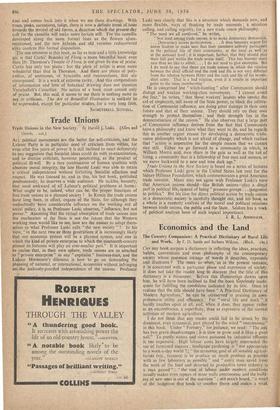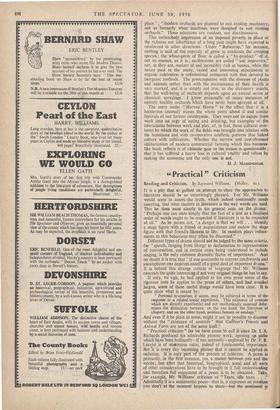Economics and the Land
The Country Companion: A Practical Dictionary of Rural Life and Work. By F. D. Smith and Barbara Wilcox. (Black. 1189.) CAN any book surpass a dictionary in reflecting the ideas, practices, habits, conventions and even philosophy 'of the contemporary society whose common coinage of words it describes, expounds and illustrates? The more so when,' as in the present instance, it is concerned with a particuiar phase and expression of society. It does not take the reader long to discover that the title of this dictionary is a misnomer. Before this ifluminatign dawns upon him, he will have been inclined to find the book hopelessly inade- quate for fulfilling the conditions indicated by its title. Once he realises that the title should have been " A Practical Dictionary' of Modern Agriculture," he can be unreserved' in praising its com- prehensive utility and efficiency. For " rural life and work " it hardly touches upon at all, and, when it does, they appear rather as an encumbrance, a superfluity, than as expressive of the normal activities of modern agriculture.
I do not think that any reader could fail to be struck by the dominant, even tyrannical, part played by the word " uneconomic." in this book. Under " Forestry," for instance, we read: " The oak has two grave disadvantages ; it is slow to grow and it likes a good soil." To purify waters and rivers poisoned by industrial effluents is too expensive. High labour costs have largely superseded the use of farmyard manure ; landscape gardening is " not appropriate to a work-a-day world " ; " the economic goal of all sensible agricul- turists (viz., farmers) is to produce as much produce as possible with as few labourers as possible " and " every man saved from the work of the land and diverted to productive town industry is a man gained": "the cost of labour under modern conditions usually makes even repairs of stone walls uneconomic and the build- ing of new ones is out of the question " ; old man's beard, " a weed of the- hedgerow that tends to smother thorn and makes a weak
place " ; " Modern orchards are planned to suit existing machinery, not as formerly when machines were designed to suit existing orchards." These selections are random, not discriminative.
This melancholy impression of an imposed poverty in place of the richness our inheiltance of a long past might have expected is reinforced in other directions. Under " Buttercup," for instance, nothing is said of the capacity of geese to eradicate the creeping species ; the wheat-germ of flour is called a " by-product " of it, not its essence, as it is ; earthworms are called " soil improvers," not, as they are, makers of soil incredibly rich in humus, while the notice paid to the many, varied and interesting experiments in organic cultivation is infinitesimal compared with that devoted to inorganic methods. The preoccupation with the diseases of plants and animals rather than with the maintenance of their health is very marked, and it is simply not true, as the dictionary asserts, that the well-being of orchards depends upon an annual series of
• chemical sprayings. I know personally of many instances of entirely healthy orchards which have never been sprayed at all.
The entry under " Harvest Home " to the effect that it is a boisterous anomaly misses the whole point about it and similar festivals of our former countryside. They were not an escape from work into an orgy of eating• and drinking, but examples of the interactions between work and play, of, in fact, those cultural over- tones by which the work of the fields was brought into relation with the numinous and with co-operative aesthetic patterns that linked
• culture with cultivation.. Whether the narrow and cost-obsessed utilitarianism of modern commercial farming which this business- like book reflects is of ultimate gain to the nation is questionable ; that it has suffered a heavy loss in cultural vitality and values by making the economic test the only one is not.
H. J. MASSINGHAM.















































 Previous page
Previous page